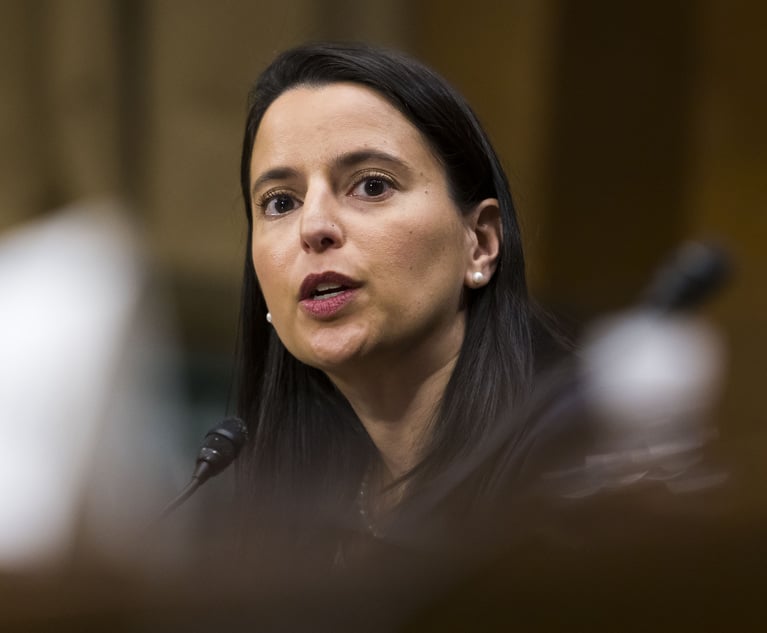Let Consumers Sue Under New Data Privacy Law, Becerra's Office Tells State
The California attorney general proposes a few changes in the new California Consumer Privacy Act. The law is set to take effect in January 2020.
February 20, 2019 at 06:50 PM
4 minute read
 Sacramento State Capitol building on Capitol Way. Photo: Jason Doiy/ Recorder
Sacramento State Capitol building on Capitol Way. Photo: Jason Doiy/ Recorder
Attorney General Xavier Becerra's office Wednesday pressed lawmakers to add a broad private right of action to the new California Consumer Privacy Act, arguing that his office doesn't have the resources to enforce the data-protection law by itself.
Speaking to a legislative panel examining the law, Stacey Schesser, supervising deputy attorney general for Becerra's privacy unit, renewed criticisms that Becerra leveled against the California Consumer Privacy Act, or CCPA, after its passage last August.
One of his complaints is that consumers will have only a limited right to sue if they are victims of a data breach. Other violations, such as a company improperly selling a customer's data, can only be pursued by the attorney general. The law takes effect in January.
“Private rights of action provide a critical adjunct to government enforcement and they ensure that consumers can assert their rights and seek appropriate remedies,” Schesser told members of the Assembly privacy committee. “The attorney general urges you to expand the CCPA private right of action to include violations of the key rights provided by this act.”
The law, enacted as an alternative to a proposed ballot initiative brought by San Francisco real estate developer Alastair Mactaggart, gives Californians the right to see what personal information companies collect about them and to opt out of the sale of that data. California's law has been the model for at least six privacy bills introduced in other states.
Schesser also asked lawmakers to strike language requiring the California attorney general's office to offer opinions to companies with compliance questions and to give businesses a chance to cure certain violations before filing a case.
“This would essentially be a get out of jail free law,” Schesser said. “The CCPA's right to cure would allow even the worst offenders to receive a pass rather than allowing the attorney general to use his prosecutorial discretion in enforcing the law.”
Sarah Boot, a lobbyist for the California Chamber of Commerce, testified that educating businesses about compliance instead of prosecuting them would be “money well spent.” And she said Becerra's request to add a private right of action “to this incredibly confusing and detailed, complex law is frightening.”
“It would be a class action bonanza,” Boot said.
The dueling critiques foreshadow the legislative battles coming over the next seven months as the law's backers and detractors fight for amendments. The audience at Wednesday's hearing was filled with representatives of consumer groups, telecommunications companies, tech lobbies, retailers and advertisers, all eager to either protect the law's current provisions, beef them up or significantly restrict their reach.
Two lawmakers who carried the Consumer Privacy Act have introduced a so-called placeholder bill that could carryl changes to the law. Another bill unveiled last week would set data-sharing rules specifically for telephone companies. And on Wednesday, Internet Association lobbyist Kevin McKinley said legislation is coming to limit what constitutes the sale of personal information under the law.
Tanya Forsheit, who chairs Frankfurt Kurnit Klein & Selz' privacy and data security group, testified that companies have spent millions of dollars trying to comply with the European Union's General Data Protection Regulation, or GDPR, laws.
“Many if not most U.S. companies are still not in compliance with the GDPR because it's such a significant undertaking,” Forsheit said. “The CCPA is even more complex and challenging … Experience with the GDPR has already demonstrated that we are going to need some changes to the CCPA and to the timeline for compliance to be realistic.”
Read more:
Business Groups Lobby for Changes to California Data Privacy Law
Alastair Mactaggart Predicts: Privacy Law Will Survive Tech Challenge
This content has been archived. It is available through our partners, LexisNexis® and Bloomberg Law.
To view this content, please continue to their sites.
Not a Lexis Subscriber?
Subscribe Now
Not a Bloomberg Law Subscriber?
Subscribe Now
NOT FOR REPRINT
© 2025 ALM Global, LLC, All Rights Reserved. Request academic re-use from www.copyright.com. All other uses, submit a request to [email protected]. For more information visit Asset & Logo Licensing.
You Might Like
View All
Judge Accuses Trump of Constitutional End Run, Blocks Citizenship Order
3 minute read
Chicago Law Requiring Women, Minority Ownership Stake in Casinos Is Unconstitutional, New Suit Claims
5 minute read
Trending Stories
- 1CFPB Labor Union Files Twin Lawsuits Seeking to Prevent Agency's Closure
- 2Crypto Crime Down, Hacks Up: Lawyers Warned of 2025 Security Shake-Up
- 3Atlanta Calling: National Law Firms Flock to a ‘Hotbed for Talented Lawyers’
- 4Privacy Suit Targets Education Department Over Disclosure of Student Financial Data to DOGE
- 5Colwell Law Group Founder Has Died in Skiing Accident
Who Got The Work
J. Brugh Lower of Gibbons has entered an appearance for industrial equipment supplier Devco Corporation in a pending trademark infringement lawsuit. The suit, accusing the defendant of selling knock-off Graco products, was filed Dec. 18 in New Jersey District Court by Rivkin Radler on behalf of Graco Inc. and Graco Minnesota. The case, assigned to U.S. District Judge Zahid N. Quraishi, is 3:24-cv-11294, Graco Inc. et al v. Devco Corporation.
Who Got The Work
Rebecca Maller-Stein and Kent A. Yalowitz of Arnold & Porter Kaye Scholer have entered their appearances for Hanaco Venture Capital and its executives, Lior Prosor and David Frankel, in a pending securities lawsuit. The action, filed on Dec. 24 in New York Southern District Court by Zell, Aron & Co. on behalf of Goldeneye Advisors, accuses the defendants of negligently and fraudulently managing the plaintiff's $1 million investment. The case, assigned to U.S. District Judge Vernon S. Broderick, is 1:24-cv-09918, Goldeneye Advisors, LLC v. Hanaco Venture Capital, Ltd. et al.
Who Got The Work
Attorneys from A&O Shearman has stepped in as defense counsel for Toronto-Dominion Bank and other defendants in a pending securities class action. The suit, filed Dec. 11 in New York Southern District Court by Bleichmar Fonti & Auld, accuses the defendants of concealing the bank's 'pervasive' deficiencies in regards to its compliance with the Bank Secrecy Act and the quality of its anti-money laundering controls. The case, assigned to U.S. District Judge Arun Subramanian, is 1:24-cv-09445, Gonzalez v. The Toronto-Dominion Bank et al.
Who Got The Work
Crown Castle International, a Pennsylvania company providing shared communications infrastructure, has turned to Luke D. Wolf of Gordon Rees Scully Mansukhani to fend off a pending breach-of-contract lawsuit. The court action, filed Nov. 25 in Michigan Eastern District Court by Hooper Hathaway PC on behalf of The Town Residences LLC, accuses Crown Castle of failing to transfer approximately $30,000 in utility payments from T-Mobile in breach of a roof-top lease and assignment agreement. The case, assigned to U.S. District Judge Susan K. Declercq, is 2:24-cv-13131, The Town Residences LLC v. T-Mobile US, Inc. et al.
Who Got The Work
Wilfred P. Coronato and Daniel M. Schwartz of McCarter & English have stepped in as defense counsel to Electrolux Home Products Inc. in a pending product liability lawsuit. The court action, filed Nov. 26 in New York Eastern District Court by Poulos Lopiccolo PC and Nagel Rice LLP on behalf of David Stern, alleges that the defendant's refrigerators’ drawers and shelving repeatedly break and fall apart within months after purchase. The case, assigned to U.S. District Judge Joan M. Azrack, is 2:24-cv-08204, Stern v. Electrolux Home Products, Inc.
Featured Firms
Law Offices of Gary Martin Hays & Associates, P.C.
(470) 294-1674
Law Offices of Mark E. Salomone
(857) 444-6468
Smith & Hassler
(713) 739-1250







